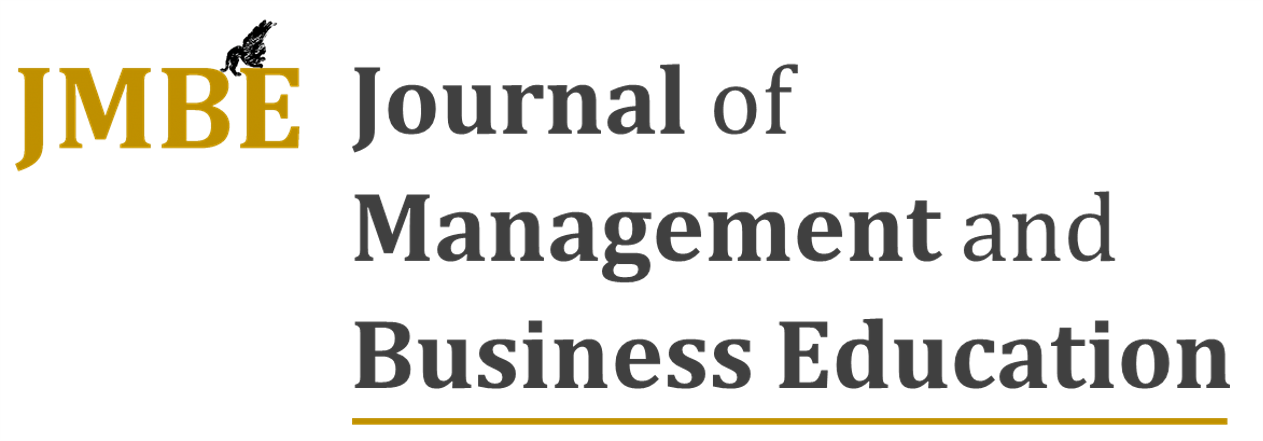Ikasekin: design of an holistic learning model for the development of entrepreneurial competence
DOI:
https://doi.org/10.35564/jmbe.2020.0003Keywords:
creativity, innovation, entrepreneur spirit, project-based learning, cross-cutting competencesAbstract
Progress in the development of key educational competencies for labor insertion and entrepreneurship in our society, such as creativity, innovation and entrepreneurship, are being very numerous in recent decades. Teachers are promoting programs to implement new methodologies for achieving this goal. However, the university community lacks validated methodologies with measurement of results in the medium and long term. The aim of this paper is to present the validation methodology of the teaching method we have agreed to call IKASEKIN, to achieve educational competence "Ability to develop Creativity, Innovation and Entrepreneurship" in the university environment. This method has been implemented in the Marketing degree of the University of the Basque Country UPV/EHU. The results show that the entrepreneurial capacity of the students, after taking two subjects through Project Based Learning in the second year, is strengthened over time when taking a course directly involved with the entrepreneurship in the fourth year.
Downloads
References
Arroyo Vázquez, M. y Jiménez-Sáez, F. (2008). “La incorporación de la innovación y el emprendedurismo en la Educación Superior: una formación de futuro”. Actas V Congreso Iberoamericano de Docencia Universitaria, Valencia.
Audretsch, D. (2014): From the entrepreneurial university to the university for the entrepreneurial society. Journal of Technology Transfer, 39(3), pp. 313–321.
http://doi.org/10.1007/s10961-012-9288-1
Backes-Gellner, U. and Werner, A. (2007): Entrepreneurial Signaling via Education: A Success Factor in Innovative Start-Ups, Small Business Economics 29(1), pp.173-190.
http://doi.org/10.1007/s11187-006-0016-9
Calzado-Barbero, M.; Fernández-Portillo, A.; & Almodóvar-González, M. (2019). Educación emprendedora en la universidad. Journal of Management and Business Education, 2(2), 127-159.
https://doi.org/10.35564/jmbe.2019.0011
Clark, B. (1998): Creating entrepreneurial universities: Organizational pathways of transformation. Oxford: Pergamon Press.
Clark, B. (2001): The entrepreneurial university: New foundations for collegiality, autonomy, and achievement. Higher Education Management, 13(2), pp. 9–24.
Etzkowitz, H. (1998): The norms of the entrepreneurial science: Cognitive effects of the new university-industry linkages. Research Policy, 27(8), pp. 823–833.
https://doi.org/10.1016/S0048-7333(98)00093-6
Etzkowitz, H. (2004): The evolution of the entrepreneurial university. International Journal of Technology and Globalization, 1(1), pp. 64–77.
http://doi.org/10.1504/IJTG.2004.004551
European Commission. (2012): Rethinking education: Investing in skills for better socio-economic outcomes. COM (2012) 669.
European Commission. (2014): Indicators on entrepreneurial learning and competence. Final Report of Expert Group on. Chatzichris, S.
Fernández-Portillo, A. (2018). Aproximación a la educación emprendedora. Journal of Management and Business Education, 1(3), 182-189.
https://doi.org/10.35564/jmbe.2018.0013
Garavan, T.N., & O’ Cinneide, B. (1994). Entrepreneurship education and training programmes: A review and evaluation - Part 1. Journal of European Industrial Training, 18(8), pp. 3-13.
http://doi.org/10.1108/03090599410068024
Gibb, A. (2005): “Towards the entrepreneurial university”, Policy Paper 003, National Council for Graduate Entrepreneurship – NCGE, Birmingham.
Hansemark, O. (1998): The effects of a program on need for achievement and locus of control of reinforcement. International Journal of Entrepreneurship Behaviour and Research, 4(1), pp. 28-50.
http://doi.org/10.1108/13552559810203957
Hernández-Mogollón, R., Fernández-Portillo, A., Díaz-Casero, J.C., Sánchez-Escobedo, M.C. (2018). ¿Es posible trabajar la educación emprendedora universitaria en contextos poco favorables para ello? Journal of Management and Business Education, 1(2), 160-181.
https://doi.org/10.35564/jmbe.2018.0012
Harris, M. L. and Gibson, S. G. (2008): “Examining the entrepreneurial attitudes of US business students”, Education+Training, vol. 50, nº 7, pp. 568-581.
http://doi.org/10.1108/00400910810909036
Jamieson, I. (1984). “Education for enterprise”. In Watts, A.G., & Moran, P. (Eds.). CRAC, Ballinger, Cambridge, pp. 19-27.
Kuratko, D.F., & Hodgetts, R.M. (2004): Entrepreneurship: Theory, process and practice (6th edition). Mason, OH: Thomson/SouthWestern Publishing.
Kuratko, D.F. (2005): The Emergence of Entrepreneurship Education: Development, Trends and Challenges; Entrepreneurship Theory and Practice, pp. 577-597.
http://doi.org/10.1111/j.1540-6520.2005.00099.x
Mitra, J. and Matlay, H. (2004): Entrepreneurial and Vocational Education and Training: Lessons from Eastern and Central Europe, Industry and Higher Education, February 2004, pp. 53-61.
http://doi.org/10.5367/000000004773040979
Raposo, M., & Do Paço, A. (2011). Entrepreneurship education: Relationship between education and entrepreneurial activity. Psicothema, 23(3), pp. 453–457.
Rincón, V. y Zorrilla, P. (2015): Desarrollo de nuevas ideas de negocio mediante el aprendizaje activo, Opción, año 31, número especial 1, pp. 790-805.
Saiz-Santos M., Araujo de la Mata A.AD., Hoyos-Iruarrizaga J. (2017): Entrepreneurial University: Educational Innovation and Technology Transfer. In: Peris-Ortiz M., Gómez J., Merigó-Lindahl J., Rueda-Armengot C. (eds) Entrepreneurial Universities. Innovation, Technology, and Knowledge Management. Springer, Cham.
Downloads
Published
How to Cite
Issue
Section
License
Copyright (c) 2023 Journal of Management and Business Education

This work is licensed under a Creative Commons Attribution-NonCommercial-ShareAlike 4.0 International License.
License terms at: https://creativecommons.org/licenses/by-nc/4.0/legalcode




